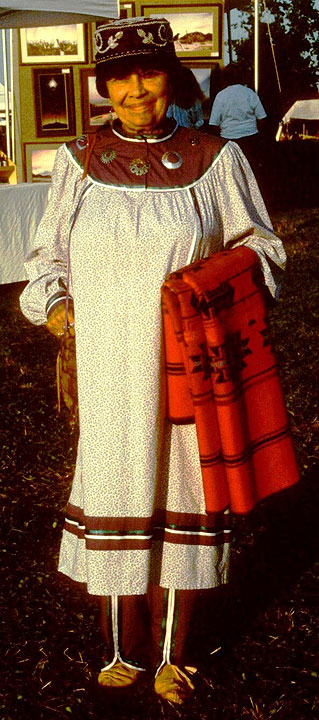A Schaghticoke storyteller
 Trudie Lamb Richmond is a highly respected exemplar of native culture in Connecticut, coming from the Schaghticoke Tribal Nation, one of five Indian tribes in the state. She has served on several boards and committees, including the Connecticut Indian Affairs Council, the state’s Native American Heritage Committee, the New England Museum Association, and the Plimoth Plantation Native American Advisory Board. Trudie’s skills as a traditional storyteller have led to her selection as a Master Teaching Artist by the Connecticut Office of the Arts and she has performed all over the Northeast as well as at the National Museum of the American Indian in Washington DC. Trudie’s educational work includes speaking to thousands of schoolchildren across Connecticut and New England, providing them with information and insight into the values, history, and creativity of Native peoples. She has collaborated with other educators, curriculum experts, scholars, and with the State Department of Education to improve the presentation of Native cultures in lesson plans and recommended texts. She recently retired after serving as the Director of Public Programs at the Mashantucket Pequot Museum and Research Center where she was responsible for the Museum’s extensive roster of performances, workshops, tours, and public events.
Trudie Lamb Richmond is a highly respected exemplar of native culture in Connecticut, coming from the Schaghticoke Tribal Nation, one of five Indian tribes in the state. She has served on several boards and committees, including the Connecticut Indian Affairs Council, the state’s Native American Heritage Committee, the New England Museum Association, and the Plimoth Plantation Native American Advisory Board. Trudie’s skills as a traditional storyteller have led to her selection as a Master Teaching Artist by the Connecticut Office of the Arts and she has performed all over the Northeast as well as at the National Museum of the American Indian in Washington DC. Trudie’s educational work includes speaking to thousands of schoolchildren across Connecticut and New England, providing them with information and insight into the values, history, and creativity of Native peoples. She has collaborated with other educators, curriculum experts, scholars, and with the State Department of Education to improve the presentation of Native cultures in lesson plans and recommended texts. She recently retired after serving as the Director of Public Programs at the Mashantucket Pequot Museum and Research Center where she was responsible for the Museum’s extensive roster of performances, workshops, tours, and public events.
The Connecticut Cultural Heritage Arts Program nominated Trudie for the First Peoples Fund Community Spirit Award which she won in 2010. Over five decades, Trudie has created understanding and appreciation for the traditions and history of Algonkian Indian peoples in southern New England, especially those in Connecticut. She spends a great deal of time mentoring young people from many of the tribal groups in New England, encouraging them to truly appreciate their heritage and present it to others. In the words of historian and writer Melissa Tantaquidgeon Zobel of the Mohegan Nation, Trudie “has inculcated generations of Native and non-Native children with an understanding of the ancient tales of this land. By utilizing the old skill of storytelling to pass on traditions, she reaffirms and shares not only the lessons but the unique methods and practices of Indian people.” She has spoken in many schools, given countless workshops, and storytelling presentations. Trudie really has become the most sought-after source of authentic information and education on, with, and for Connecticut Native people.
Trudie has so many stories! Many of them arise from her own life’s wide experience, which includes being at Wounded Knee, marrying a traditional Mohawk man from Akwesasne and becoming involved in his family there, and participating in the renaissance of the Mashantucket Pequots after their federal recognition. Equally important to her are the stories about her ancestors who lived on Schaghticoke—Gideon and Eunice Mauwee, Jim Pan Harris, Henry Harris, the Cogswells—descendants of whom who still inhabit that beautiful and contested place. Trudie has collected Algonkian stories from across New England, from elders such as Red Wing (Wampanoag) and Gladys Tantaquidgeon (Mohegan). She also has spent time with other tradition bearers such as Paula Dove Jennings (Narragansett) and Gladys Widdiss (Wampanoag), sharing stories from their respective parts of Algonkian New England.
Trudie keeps these stories and oral histories alive by telling them, writing about them, and continuing to share them with other storytellers. She has been invited by the Mohegans to teach the techniques of storytelling and the stories themselves to tribal members. She is mentoring an emerging Pequot apprentice storyteller, Candyce Testa, as part of the Southern New England Traditional Arts Apprenticeship Program. This kind of work is so important for Connecticut Native people, who have suffered severe displacement and land loss over the years and whose members are often coming back to live here for the first time. Trudie calls this re-connection “community building.”
